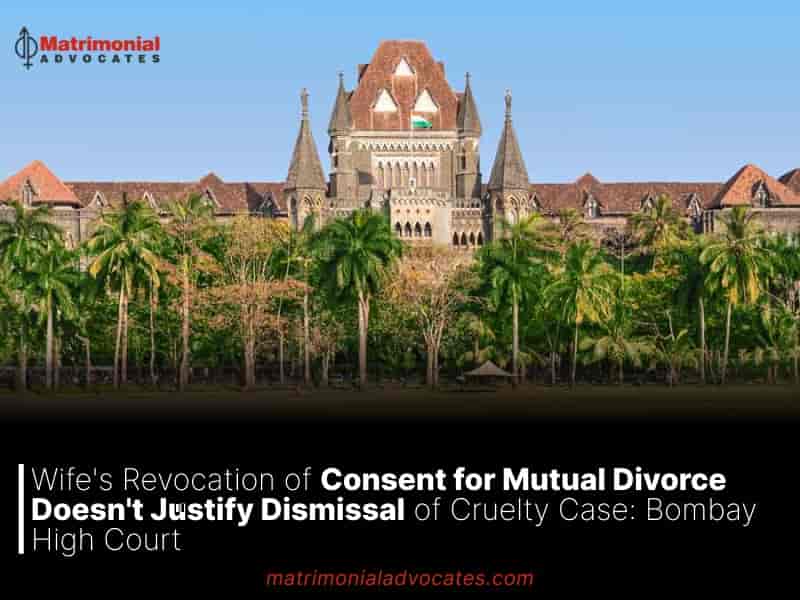
The Court observed that the Section 13B of the Hindu Marriage Act grants a party the unqualified right to withdraw consent for mutual divorce, regardless of any prior undertaking or settlement in or outside of court.
The Bombay High Court ruled on Tuesday that a wife’s decision to withdraw her consent for mutual divorce does not amount to an abuse of the legal process and cannot be grounds for dismissing ongoing cruelty proceedings initiated against her husband.
The Court emphasized the wife’s legal right to revoke her consent for divorce even after a settlement and stressed that this right should be upheld.
A Bench comprising Justices A. S. Gadkari and Neela Gokhale referred to Section 13B of the Hindu Marriage Act, which permits either party to withdraw their consent for divorce before the decree is granted.
“This being the settled legal position of Section 13B of the Hindu Marriage Act (HMA), we have no hesitation in holding that the act of the Respondent No. 2 (wife) in reneging from the Settlement Agreement cannot be said to be an abuse of the process of law to justify quashing the criminal proceedings pending against the Petitioner. The mere fact that the learned Single Judge of the Delhi High Court held the Respondent No. 2 in contempt for failing to join the Petitioner in filing a Second Motion need not deter us from endorsing the statutory right of the Respondent No. 2,” the Court said.
The Court further clarified that Section 13B of the Hindu Marriage Act distinctly upholds the absolute and unrestricted right of a party to unilaterally withdraw consent or reconsider their decision to seek a mutual divorce, regardless of any undertakings made during legal proceedings or recorded in settlements, whether within or outside the court.
The dispute between the couple began in 2015 after their Arya Samaj wedding. The wife accused the husband and his family of physical and emotional abuse. She claimed that her jewelry worth ₹35 lakh was taken by the family on the first day of the marriage and that she was harassed for dowry.
She also alleged that her mother-in-law mocked her for not bringing enough dowry and that the husband abandoned her when she suffered a slip disc. Over the next two years, their relationship worsened, with the wife accusing the husband of physical abuse, especially when he was drunk.
In March 2017, the wife alleged that the petitioner physically assaulted her after an argument, during which she was searched for stolen money. She claimed such incidents became frequent, and in April 2017, the petitioner left for Faridabad, citing a family emergency, and indicated he had no plans to return.
The wife also alleged that her husband spread false rumors about her mental health, accusing her of having schizophrenia, and tried to evict her from their shared flat in Mumbai. Later that year, she accused the petitioner and his family of demanding ₹2 crore through extortion and making violent threats. In 2018, she filed an FIR against the petitioner and his family, accusing them of dowry harassment, physical abuse, and threats, as well as taking her jewelry worth ₹45 lakh without the intention of returning it.
During the ongoing criminal case, the couple started divorce proceedings and reached a settlement in November 2022 to file for mutual divorce under Section 13B of the Hindu Marriage Act. The agreement required the petitioner to pay maintenance and transfer the shared flat to the wife. They also agreed to help close the criminal cases.
However, problems arose when the petitioner didn’t follow through with the agreement, especially with the maintenance payments and property transfer. By January 2024, the wife, who had already paid ₹10 lakh in flat maintenance charges, withdrew her consent for the mutual divorce, saying the petitioner had not kept his promises.
As a result, she chose not to take part in the second motion for divorce, leading the petitioner to challenge the continuation of the criminal proceedings against him.
The petitioner’s lawyer argued that the wife’s refusal to proceed with the divorce amounted to an abuse of the legal process. He contended that her actions breached the terms of the settlement agreement and were an abuse of the law.
In response, the wife argued that her withdrawal of consent was a valid exercise of her legal rights under the Hindu Marriage Act.
She said she had followed the settlement terms as much as she could and had already paid a significant amount toward the flat’s maintenance charges. She also argued that it was the petitioner who hadn’t kept his promises, especially regarding the transfer of the flat and alimony. Because of this, she felt justified in changing her mind about going ahead with the divorce.
The Court confirmed that the right to withdraw consent for divorce under Section 13B of the HMA is final and cannot be ignored.
It also pointed out that any interpretation that weakens this right would not only affect the court’s authority but also violate a legal right given under Section 13B(2) of the Hindu Marriage Act, going against the purpose of the law.
The Court further explained that failing to comply with the terms outlined in an affidavit or undertaking supporting the first motion under Section 13B(1) of the Hindu Marriage Act will only impact the party’s conduct if that party has benefited from the consent.
In this case, the Court noted that it was the petitioner, not the respondent-wife, who gained from the consent terms in the first motion.
“Hence, failing to give consent for quashing the present FIR pursuant to the terms of the First Motion is not an abuse of the process of law,” the Court held.
Based on these findings, the Court rejected the petition to dismiss the criminal proceedings, allowing the criminal case against the petitioner to proceed.





